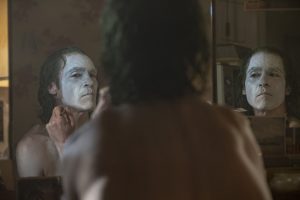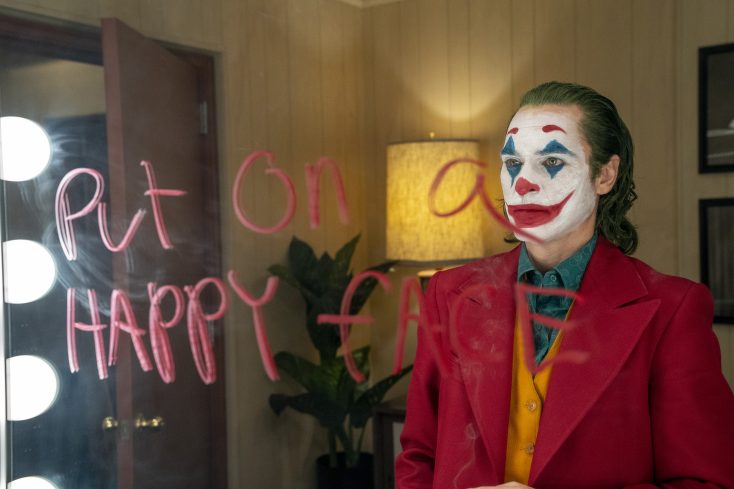
By HEATHER TURK
Front Row Features Film Critic
One of the most iconic comic book villains of all time finally gets his moment in the spotlight with Warner Bros. Pictures’ highly anticipated new film “Joker,” a deeply depressing look at the madman behind the makeup that’s oftentimes uncomfortable to watch, but an origin story that viewers won’t be able to turn away from nonetheless.
Directed by Todd Phillips, who is probably best known for helming such comedies as “Old School” and “The Hangover” trilogy, the R-rated film stars three-time Academy Award nominee Joaquin Phoenix (“The Master,” “Walk the Line,” “Gladiator”) as Arthur Fleck, a mentally disturbed man who goes on to become Batman’s arch nemesis. When audiences first meet Arthur, however, he’s far from the impulsive yet calculated homicidal maniac comic book fans have loved to hate over the years. Instead, viewers see a depressed man living with a condition that causes bursts of sudden laughter so powerful, it literally leaves Arthur gasping for air. It’s clear that Arthur has some sort of mental condition as well (and not just because his social worker mentions he’s on multiple medications), but he still goes about his day trying to make a living as a clown for hire while taking care of his sick, old mother (Frances Conroy, “Six Feet Under”) and dreaming of becoming a stand-up comedian.
When Arthur is beat up by some punk Gotham City kids while at work one day, viewers can’t help but feel bad for him. Yet, when a co-worker slips Arthur a gun to help protect himself with after hearing about the cowardly attack, audiences are fearful for what will transpire next.
Thus, Arthur’s descendance into madness begins, fueled by those who taunt and ridicule him and a shocking revelation from Arkham Asylum. By the film’s tense conclusion (and after a “Sixth Sense”-like twist in the film’s third act), when Arthur finally comes to terms with everything he has done, viewers will both sympathize with him and be terrified of the man he’s become—who in 1981 Gotham City is sadly seen as an inspiration to many.
While much has been made of the script by Phillips and Scott Silver (“8 Mile,” “The Fighter”) making the Joker seem too sympathetic and relatable, their story doesn’t heroize Arthur in any way. Phoenix delivers a performance that at times is sad but is always unstable, leaving audiences feeling unsettled and nervous throughout the film’s 121-minute run time. This is a version of the Joker that audiences haven’t really seen on the big screen, and although Arthur’s unplanned rise to a figure many in Gotham City look up to may be seen as oddly inspiring by some troubled people, his actions are never not frightening.
Phillips and Silver also do a commendable job with tying the Joker’s origin story to young Bruce Wayne’s, even throwing audiences a bit of a curve ball midway through the film that may link the two in an unexpected way. The only complaint viewers might have with this film sort of birthing Batman as well is the age difference between the two characters. By the time young Bruce Wayne (played by Dante Pereira-Olson, “You Were Never Really Here”) becomes Batman, it seems like Phoenix’s Joker would be way too old to fight him.
The film’s gritty production design by Mark Friedberg (“If Beale Street Could Talk”) and haunting soundtrack by Hildur Guðnadóttir (“Chernobyl”) also play important parts in the story and deserve to be recognized. In fact, it can be argued that Stephen Sondheim’s “Send in the Clowns” has never been used better.
As for the rest of the film’s supporting cast, while everyone delivers strong enough performances, viewers can’t help but feel that two-time Academy Award winner Robert De Niro (“Raging Bull,” “The Godfather: Part II”) is wasted as the late-night talk show host Arthur admires, Murray Franklin, given his limited amount of screen time.
Ultimately, though, “Joker” is Phoenix’s film from beginning to end, and his “Taxi Driver”-esque performance is truly mesmerizing. Phoenix adds yet another name comic book fans can fight over when debating who portrayed the Joker on the big screen the best and it will be interesting to see if he becomes the second actor to win an Oscar for playing the part (following Heath Ledger’s win for “The Dark Knight”), especially since he’s given so much more material to work with. This Joker may not be as fun (for lack of a better word) to watch on the big screen, but there’s no question he deserves the audience’s full attention.
Grade: B+





